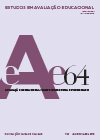I know what I have to do: the conquest of self-regulation
DOI:
https://doi.org/10.18222/eae.v27i64.3673Keywords:
Learning, Self-regulation, Evaluation of Learning, Cultural-historical PsychologyAbstract
Self-regulated learning has been studied extensively in the field of Educational Psychology, since it allows the students to plan, direct, monitor and evaluate their learning. Notwithstanding, in many schools, these possibilities are not mastered by the students, leading to serious damage to the development of problem-solving skills, and hence, to reasoning itself. From a Vygotskian perspective, the present article analyzes a real case – described by the authors from their own perspective (but endorsed by some students) – and seeks to show that it is possible to teach self-regulation to students. The study highlights, however, that the path to achieve success in learning involves building trust relationships within the classroom and the understanding of error as an inherent part of learning.
Downloads
References
BANDURA, A. Social foundations of thought and action: a cognitive theory. New Jersey: Englewood Cliffs, 1986.
BANDURA, A.; AZZI, R. G.; POLYDORO, S. et al. Teoria social cognitiva: conceitos básicos. Porto Alegre: Artmed, 2008.
BORUCHOVITCH, E. Autorregulação da aprendizagem: contribuições da psicologia educacional para a formação de professores. Psicologia Escolar e Educacional, v. 18, n..3, p. 401-409, set./dez. 2014.
CATE, O. T. et al. Orienting teaching toward the learning process. Academic Medicine, v. 79, n. 3, p. 219-228, 2004.
LINS, M. R. C.; ARAUJO, M. R.; MINERVINO, C. A. S. M. Estratégias de aprendizagem empregadas por estudantes do ensino fundamental. Psicologia Escolar e Educacional, v. 15, n. 1, p. 63-70, jan./jun. 2011.
MCCASLIN, M.; GOOD, T. L. The informal curriculum. In: BERLINER, D. C.; CALFEE, R. C. (Ed.). Handbook of Educational Psychology. New York: Simon & Schuster Mac Millan, 1996.
NEITZEL, C; DAVIS, D. Direct and indirect effects of teacher instruction and feedback on student adaptive help-seeking in upper-elementary literacy classrooms. Journal of Research in Education, v. 24, n. 1, p. 53-68, 2014.
PARIS, S. G.; PARIS, A. H. Classroom applications of research on self-regulated learning. Educational Psychologist, v. 36, n. 2, p. 89-101, 2001.
POZO, J. I. Estratégias de aprendizagem. In: COLL, C.; PALACIOS, J.; MARCHESI, A. (Org.). Desenvolvimento psicológico e educação. Porto Alegre: Artes Médicas, 1996. v. 2.
TISHMAN, S.; PERKINS, D. N.; JAY, E. A cultura do pensamento na sala de aula. Porto Alegre: Artmed, 1999.
ZIMMERMAN, B. J. Investigating self-regulation and motivation: historical background, methodological developments and future prospects. American Educational Research Journal, v. 45, n. 1, p. 166-183, 2008.
ZIMMERMAN, B. J.; SCHUNK, D. H. Self-regulated learning and performance. In: ZIMMERMAN; B. J.; SCHUNK, D. H. (Ed.). Handbook of self-regulation of learning and performance. New York: Routledge, 2011. p. 1-12.
ZIMMERMAN, B. J.; SCHUNK, D. H. (Ed.). Self-regulated learning and academic achievement: theoretical perspectives. Hillsdale, Jew Jersey: Erlbaum, 2001.
Downloads
Published
How to Cite
Issue
Section
License
Authors who publish in this journal agree to the following terms:
a. Authors retain the copyright and grant the journal the right to first publication, with the paper simultaneously licensed under the Creative Commons Attribution License (CC BY 4.0) license that allows the sharing of the paper with acknowledgment of authorship and initial publication in this journal.
b. Authors are authorized to assume additional contracts separately, for non-exclusive distribution of the version of the paper published in this journal (for example publishing in institutional repository or as a book chapter), with acknowledgment of authorship and initial publication in this journal.
c. Authors are allowed and encouraged to publish and distribute their paper on-line (for example in institutional repositories or on their personal page) at any moment before or during the editorial process, as this can generate productive changes, as well as increase the impact and citation of the published paper (See The Effect of Open Access).







